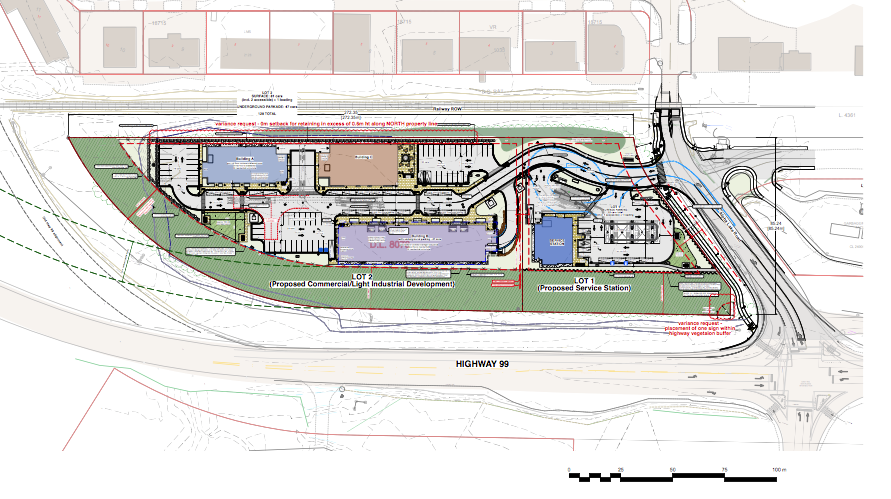More than four years after it was first proposed, a Lil’wat Nation-led project slated for Function Junction is finally set to move forward, closing the loop on a legacy left over from Whistler’s 2010 Olympics.
Owned by the Nation as part of the Legacy Land Agreement that was inked ahead of the 2010 Games, the 2.15-hectare site at 1000 Alpha Lake Road will see a service station and three mixed-use buildings with 48 units of employee housing constructed after local officials greenlit a development permit at Whistler’s Feb. 8 council meeting.
“It’s been long and we’ve been patiently waiting, trying to understand the whole process,” said Kúkwpi7 Skalúlmecw Lil’wat Chief Dean Nelson. “It’s a presence for the Nation and [provides] opportunities for us and for partners.”
The project has seen numerous delays since it was proposed in October 2017, and came back to the council table this week with a slew of changes since it was first seen, some of which, like the increase of planned employee housing units from 18 to 48, were previously approved.
One particularly challenging element of the project was roadwork. The original proposal called for more significant improvements, but ultimately the Nation and B.C.’s Ministry of Transportation and Infrastructure (MOTI) settled on a more incremental approach. Plans now include dedicated left-hand and right-hand turn lanes as well as a straight-through lane departing Function, along with the addition of a 110-metre southbound acceleration lane on Highway 99. Lynham Road will also be realigned to form an intersection with the access point into the development, while the Valley Trail will be connected from the intersection at Highway 99 to the nearby CN Rail crossing.
The Lil’wat and MOTI will split the roadwork responsibilities.
Exactly how the project—which allows for office, commercial, industrial and residential use—will affect traffic in Whistler’s southern neighbourhood isn’t clear. The Resort Municipality of Whistler denied Pique’s Freedom of Information request in 2018 to obtain a copy of a traffic study connected to the project at the Lil’wat’s request—but the Nation has concluded the project will generate about a five-per-cent increase in traffic.
In September 2021, MOTI provided the RMOW with a letter stating it had no objections to the proposed development.
The site plan divides the parcel into two lots: Lot 1 for the service station that will be operated by the Lil’wat Business Group, and Lot 2 for the three mixed-use buildings.
The 48 units of employee housing will provide 184 total bed units, far exceeding the 58 bed units required by a 2019 housing agreement. That comes with an additional 287 square metres of employee housing space, for a total of 6,711 sq. m., as well as added parking. The building heights in Lot 2 have also been raised to accommodate an additional floor of housing, while Buildings B and C have been moved closer together in the designs to improve connection within the development.
While it’s still too early to say what commercial tenants will end up occupying the site, the gas station allows for limited restaurant use, while plans for Building C on Lot 2 have been revised to allow for a purpose-built brewery space.
The service station will offer standard gas and diesel pumps, along with electric vehicle charging stations. Councillor Arthur De Jong asked about the economic viability of the station given the transportation industry’s push to electric and autonomous vehicles. Auto manufacturers such as GM and Volkswagen are investing big into transforming their fleet all-electric within the next two decades, and a 2019 report by Boston Consulting Group predicted 80 per cent of America’s 150,000 or so retail gas stations could be unprofitable by 2035.
“It’s just making sure we position for the future or at least ask those questions to set this project up for success,” De Jong said.
There is a lengthy list of 13 recommendations the proponent will have to complete as a condition of its development permit, including environmental protection and monitoring, wildfire mitigation, signage and a security of $440,920 provided prior to construction to ensure the planned landscaping work gets carried out.




